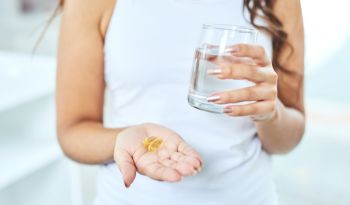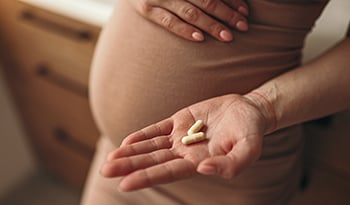Горещи вълни: Какви са те + 10 най-добри добавки за подкрепа

Страховитата гореща вълна. Тя се появява от нищото. Изведнъж усещате горещина, особено в областта на гърдите, шията и лицето. Топлината се разпространява бързо по тялото ви и зачервява кожата ви, така че изглежда, че се изчервявате. Започвате да се потите: малко или много! Докато сваляте пластовете, може да усетите ускорен сърдечен ритъм и сърцебиене и да започнете да се чувствате тревожни. След като мига отмине, усещате студ и тръпки от загубата на телесна топлина и посягате към току-що свалените пластове.
Притеснително, неудобно и дори смущаващо, усещането за горещина преминава бързо, като обикновено продължава само от една до пет минути. Въпреки това, в зависимост от тежестта и честотата, горещите вълни могат да влошат деня ви, да попречат на ежедневните ви дейности и да влошат качеството ви на живот.
Горещите вълни могат да бъдат чести или епизодични: да се появяват няколко пъти седмично или два пъти на час; да са леки или умерени до тежки. Когато горещите вълни се появяват през нощта, те се наричат нощно изпотяване. Те могат да ви събудят и да причинят смущения в съня и дори безсъние.
Известни още като горещи вълни или вазомоторни симптоми, горещите вълни са най-често срещаният симптом по време на прехода към менопауза и често са първият признак, че навлизате в перименопауза. Според проучване в Journal of Midlife Health около 85% от жените в менопауза изпитват горещи вълни, а около 55% ги изпитват, когато менструалният цикъл започне да става нередовен. Въпреки че всяка жена преживява прехода към менопауза по различен начин, горещите вълни обикновено стават по-чести и интензивни с наближаването на менопаузата, като достигат своя връх в края на прехода към менопауза и постепенно намаляват.
Дори и след като достигнете менопаузата - моментът, в който нямате менструация в продължение на цяла година - горещите вълни могат да продължат с години. Според изследване на проучването на здравето на жените в страната (SWAN) "горещите вълни и нощното изпотяване продължават средно около седем години, а може да продължат и 11 или повече години". Независимо от продължителността им, горещите вълни са досадни, притеснителни и пречат на доброто ви настроение.
Какво представляват горещите вълни?
Горещите вълни са вид температурна дисфункция, която обикновено се причинява от промените в нивата на хормоните преди, по време и след менопаузата. Основната телесна температура обикновено остава в определен диапазон, който се променя малко през деня, за да се поддържа добрата работа на органите. Тялото разполага с множество механизми за поддържане на тази последователност. Например, когато ви е студено, треперите, за да повишите телесната си температура, а когато ви е твърде горещо, се потите, за да се охладите.
Изследователите не знаят точно защо промените в хормоните, особено в естрогена, предизвикват горещи вълни. Те смятат, че промените в естрогена влияят на пътищата и механизмите в организма, които помагат за поддържане на телесната температура в нормални граници.
Какво повишава риска от горещи вълни?
Няколко рискови фактора могат да увеличат риска от поява или по-чести горещи вълни. Сред тях са тютюнопушенето и високият индекс на телесна маса (ИТМ). Расата също може да бъде рисков фактор. Чернокожите жени съобщават за по-чести горещи вълни, докато азиатските жени твърдят, че ги изпитват по-рядко.
Рискове, свързани с горещите вълни
Изследванията показват, че горещите вълни могат да бъдат свързани със сърдечносъдови заболявания. Проучването SWAN установява, че при жените с по-чести горещи вълни рискът от инфаркт, инсулт и сърдечна недостатъчност е два пъти по-висок.
Въпреки че изследователите не са сигурни дали лечението на горещите вълни ще намали риска от сърдечни заболявания, наличието им може да означава, че рискът от сърдечни заболявания е по-висок. Ако не се грижите за здравето на сърцето си, средната възраст е подходящ момент да промените начина си на живот и да се уверите, че нивата на кръвното налягане и холестерола са в здравословни граници. Особено важно е да наблюдавате и да се грижите за здравето на сърцето си по време на менопаузата, тъй като естрогенът помага на жените да се предпазят от инфаркт и инсулт, докато намаляващите му нива увеличават риска.
Има много неща, които можете да направите, за да подобрите здравето на сърцето си. Започнете с диета от средиземноморски тип, управление на стреса и редовни физически упражнения. Приемането на някои добавки също може да помогне.
Преглед на проучванията на хранителни добавки, които намаляват сърдечносъдовия риск, публикуван в Journal of the American College of Cardiology, заключава, че "Добавянето на n-3 мастни киселини, n-6 мастни киселини, l-аргинин. , л-цитрулин. , фолиева киселина. , витамин D. , магнезий, цинк, α-липоева киселина, коензим Q10, мелатонин, катехин, куркумин, флаванол, генистеин и кверцетин показаха умерени до висококачествени доказателства за намаляване на рисковите фактори за ССЗ." Зелен чай, ленено семе масло, магнезий, червена мая ориз, и чесънът също могат да помогнат за подобряване на здравето на сърцето ви.
Топ 10 добавки за горещи вълни
Някои добавки подпомагат здравето на сърцето ви по време на менопаузата, а други могат да ви помогнат да се справите с горещите вълни и нощното изпотяване. По-долу са представени 10-те най-добри добавки за подпомагане на менопаузата и горещите вълни.
1. Черен кохош
Многогодишно растение, произхождащо от Северна Америка, черният кохош се използва повече от век за лечение на много здравословни проблеми, включително менструални нарушения, депресия по време на менопауза, нощно изпотяване и горещи вълни. В традиционната китайска медицина черният кохош се използва за лечение на умора, недостиг на въздух и пролабирала матка.
Подобно на много от разгледаните тук добавки, черният кохош е фитоестрогенна билка, което означава, че съдържа растителни съединения, които действат като естроген в организма. Въпреки че не е ясно как точно действа черният кохош, той може да модулира естрогена, да влияе на невротрансмитера серотонин, да въздейства върху възпалението или да действа като антиоксидант.
В едно проучване, проведено сред 80 жени в постменопауза с горещи вълни, на които е бил прилаган черен кохош в продължение на осем седмици, се наблюдава намаляване на броя и тежестта на горещите вълни и подобряване на качеството на живот.
Черният кохош може да се приема под формата на тинктура, таблетки или капсули.
2. Vitex (известен още като Chaste Berry или Chaste Tree)
Храст, разпространен в Средиземноморието, Европа и Централна Азия, Vitex е широко използван за лечение на женски здравословни проблеми, включително ПМС, фиброзни кисти, нередовна менструация и симптоми на менопауза. Хипократ е използвал витекс при наранявания и възпаления още през 450 г. пр.н.е., а Плиний Стари е използвал растението за подпомагане на менструацията и лактацията.
Учените смятат, че витексът влияе върху нивата на хормоните чрез оста хипоталамус-хипофиза-яйчници - система, която регулира женската репродукция. Малко рандомизирано контролирано проучване на 52 корейски жени установява, че в сравнение с контролната група участничките, които приемат витекс в продължение на осем седмици, изпитват по-малко горещи вълни, по-малко тревожност и общи симптоми на менопауза.
Както семената, така и плодовете на растението се използват за производството на хранителни добавки, които се предлагат под формата на течен екстракт или капсули.
3. Масло от вечерна иглика
Произхождащо от Северна и Южна Америка и наречено така, защото жълтите му цветове се отварят при залез слънце, маслото от семена на вечерна иглика се използва при симптоми на менопауза, ПМС, висок холестерол и възпалителни кожни проблеми като екзема и акне. Подобно на другите споменати билки, маслото от вечерна иглика има фитоестрогенни свойства, които могат да действат чрез въздействие върху естрогенните рецептори и увеличаване на нивата на естроген.
Макар че са необходими още изследвания, за да се докаже ефективността му, рандомизирано контролирано проучване, публикувано в Journal of Menopausal Medicine, установи, че в сравнение с контролната група жените, които са приемали 1000 милиграма масло от вечерна иглика два пъти дневно, са имали по-малко и по-слабо нощно изпотяване и по-кратки и по-редки и силни горещи вълни.
Друго рандомизирано клинично проучване, проведено сред 56 жени в менопауза на възраст между 45 и 59 години, установи, че в сравнение с контролната група жените, които са приемали 500 милиграма масло от вечерна иглика в продължение на шест седмици, са имали подобрения в честотата, тежестта и продължителността на горещите вълни. Въпреки това само тежестта на горещите вълни е значително по-добра в сравнение с контролите.
Проучването на 80 жени в постменопауза, което установи, че черният кохош е ефективно средство за лечение на горещи вълни, също така заключи, че маслото от вечерна иглика намалява силата на горещите вълни, но не и общия им брой.
Маслото от вечерна иглика обикновено се предлага под формата на мек гел.
4. Червена детелина
Многогодишно растение, което се среща в Европа, Западна Азия, Африка, Северна и Южна Америка, червената детелина е важно лечебно растение и опрашител. Използва се за лечение на симптомите на менопаузата, включително горещи вълни, депресия, тревожност и вагинална сухота, но също така се използва за понижаване на нивата на холестерола, за намаляване на теглото и за подобряване на здравето на кожата, косата и костите.
Въпреки че са необходими още изследвания, преглед и мета-анализ на червената детелина като средство за лечение на горещи вълни и симптоми на менопаузата установи намаляване на честотата на горещите вълни в сравнение с контролите. Рандомизирано контролирано проучване на 50 жени преди и след менопауза, които приемат женски комплекс, съдържащ червена детелина заедно с черен кохош. , донг куай. , млечен бодил. , американски женшен, и плодове от целомъдрено дърво в продължение на три месеца е установено 73% намаление на броя на горещите вълни и 69% намаление на нощното изпотяване при жените, приемащи добавката.
Червената детелина може да се приема като капсула или таблетка или да се пие като чай.
5. Мака
Кръстоцветният адаптогенен кореноплоден зеленчук, произхождащ от Перу, мака предлага множество потенциални ползи за здравето. Наред с намаляването на симптомите на менопаузата (включително горещи вълни, вагинална сухота и ниско либидо), мака се използва за подобряване на паметта и настроението, за намаляване на кръвното налягане и за повишаване на енергийните нива.
Смятана за суперхрана, маката е изключително питателна и лесно се добавя към печени изделия, смутита и десерти. 50 грама (около 2/3 от чаша) съдържат 7 грама протеини, 3 грама фибри, 41% от дневната стойност (ДС) за желязо, 12% от ДС за калций и над 200% от ДС за витамин С. Мака може да се консумира и като капсула или чай.
Мака може да помогне за балансиране и регулиране на нивата на хормоните. Малко рандомизирано контролирано проучване, проведено сред жени в постменопауза на възраст от 49 до 58 години, заключава, че в сравнение с контролната група, при лицата, приемали мака, се наблюдава значително намаляване на горещите вълни и обилното изпотяване, както и на други симптоми на менопаузата като промени в настроението, умора, стрес и понижено либидо.
6. Женшен
Коренът и билката, използвани в традиционната китайска медицина, женшенът има многобройни ползи за здравето. Наред с лечението на симптомите на менопаузата, той може да намали възпалението, да регулира кръвната захар, да увеличи енергията, да подсили имунната система и да подобри настроението и паметта.
Систематичен преглед на 15 рандомизирани контролирани проучвания заключава, че "женшенът може значително да намали горещите вълни, симптомите на менопаузата и качеството на живот при жени в менопауза".
Съществуват две основни разновидности: Американски женшен и корейски червен женшен (известен още като Panax Ginseng). Макар че и двата вида съдържат активни растителни съединения, наречени гинсенозиди, корейският женшен е по-силен. Женшенът може да се приема под формата на капсули, чай или тоник, а също така се съдържа в комплекси от добавки, предназначени за повишаване на енергията.
7. Валериана
ВалерианаБилката, произхождаща от Европа и Азия, предлага двоен здравословен ефект за жените, които преминават през менопауза. Първо, той може да намали горещите вълни. Второ, той успокоява нервната система, което може да подобри често срещани нарушения на съня в менопаузата, като например безсъние.
При едно проучване, проведено сред 68 жени в менопауза, е установено, че в сравнение с контролната група, при лицата, които са приемали 255 милиграма капсули валериана три пъти дневно в продължение на осем седмици, се наблюдава статистически значимо намаляване на силата и честотата на горещите вълни.
Валерианата може да се приема под формата на капсула, тинктура или чай и се среща в комбинация с други релаксиращи, подпомагащи съня билки като хмел и маточина. .
8. Копър
Едно от малкото растения, които са едновременно зеленчук, билка и подправка, копърът е прекрасна храна с вкус на женско биле, богата на фитоестрогени. Растението може да се консумира от стъблата до корена сурово или сготвено, а семената да се използват като подправка. Можете също така да пиете чай от резене или да консумирате капсули със семена от резене като добавка.
Изследванията показват, че добавката от копър под формата на капсули може не само да помогне при горещи вълни, но и да намали тревожността, безсънието и вагиналната сухота, свързани с прехода към менопауза. При плацебо-контролирано проучване на 90 жени в постменопауза е установено, че лицата, приемащи две капсули от 100 милиграма резене в продължение на осем седмици, са намалили симптомите на менопаузата.
Систематичен преглед и мета-анализ на ефекта на копъра върху жени в менопауза установи статистически значимо подобрение не само на горещите вълни, но и на вагиналната сухота и сексуалното удовлетворение.
Друго рандомизирано проучване на 68 жени в постменопауза, публикувано в Journal of Menopausal Medicine, установява, че в сравнение с плацебо екстрактът от копър и валериана облекчава нарушенията на съня и тежестта и честотата на горещите вълни.
9. Соя
Дали се консумира като тофу, темпе, едамамеили като протеинов прах. , консумирането на повече соеви продукти може да помогне за охлаждане на горещите вълни. След 50-годишна възраст жените трябва да приемат с около 50% повече протеини, за да поддържат мускулната си маса, така че консумацията на повече соя може да ви помогне да задоволите нуждите на организма си.
Подобно на някои от другите споменати добавки, соята съдържа фитоестрогени, растителни съединения, които могат да имат подобен ефект на произвеждания от организма естроген. Тези растителни химикали може да са причина за способността на соята да намалява симптомите на менопаузата.
Анализът и систематичният преглед на ефикасността на фитоестрогените при симптомите на менопаузата стигат до заключението, че "фитоестрогените изглежда намаляват честотата на горещите вълни при жени в менопауза без сериозни странични ефекти".
Освен това рандомизирано клинично проучване от 2018 г., проведено сред 204 жени, които се оплакват от горещи вълни, установи, че в сравнение с контролната група жените, които консумират 50 милиграма соев изофлавон в продължение на 12 седмици, изпитват по-малко и по-слабо изразени горещи вълни.
Проучването WAVS (Women's Study for the Alleviation of Vasomotor Symptoms), проведено сред жени в постменопауза, които са имали поне две горещи вълни на ден, установи, че при жените, които са приемали веганска диета с ниско съдържание на мазнини и половин чаша варени цели соеви зърна в продължение на 12 седмици, честотата и силата на горещите вълни са намалели в сравнение с контролната група. Впечатляващите 59% от жените в интервенционната група напълно спират да изпитват умерени до силни горещи вълни.
10. Сминдух
Сродна на соята билка, сминдухът се използва в традиционната китайска и индийска медицина за лечение на различни заболявания - от затлъстяване (помага за намаляване на апетита) и високо кръвно налягане до храносмилателни проблеми и мигрена. Екстракти от растението, които миришат на кленов сироп, се използват в чайове, сапуни, подправки и козметика.
В едно проучване се установява, че жените на възраст между 40 и 65 години, които приемат 600 милиграма екстракт от семена на сминдух в продължение на 12 седмици, отчитат значително намаляване на горещите вълни и нощното изпотяване и подобряване на качеството на живот в сравнение с контролната група, която приема плацебо.
Семената от сминдух могат да се приемат под формата на капсули или течен стандартизиран екстракт. Предлага се и под формата на чай или прах, който може да се добавя към течности като мляко или сок.
Вземане на храна
Ако сте една от многото жени, които изпитват симптоми на менопауза, като горещи вълни и нощно изпотяване, успокойте се, че не сте сами и че много ефективни, натурални добавки могат да ви помогнат да се справите със симптомите.
Преди да започнете да приемате каквито и да било добавки, винаги е добре да се консултирате с вашия лекар, особено ако приемате лекарства с рецепта и/или сте бременна. (Да, можете да забременеете по време на прехода към менопауза.)
Ако изпитвате горещи вълни, наред с използването на хранителни добавки, помислете за увеличаване на приема на плодове и зеленчуци, редовни физически упражнения, намаляване на кофеина и алкохола, ограничаване на пикантните храни и храните с високо съдържание на добавени захари, отказване от пушенето, ако сте пушач, справяне със стреса и, разбира се, обличане на пластове.
Препратки:
- An P, Wan S, Luo Y, et al. Добавяне на микроелементи за намаляване на сърдечносъдовия риск. J Am Coll Cardiol. 2022 Dec, 80 (24) 2269-2285.
- Avis NE, Crawford SL, Greendale G, Bromberger JT, Everson-Rose SA, Gold EB, et al. Продължителност на менопаузалните вазомоторни симптоми през прехода към менопауза. JAMA Intern Med. 2015;175:531-9
- Barnard ND, Kahleova H, Holtz DN, Del Aguila F, Neola M, Crosby LM, Holubkov R. Проучване на жените за облекчаване на вазомоторните симптоми (WAVS): рандомизирано, контролирано проучване на растителна диета и цели соеви зърна за жени в постменопауза. Менопауза. 2021 Jul 12;28(10):1150-1156.
- Bansal R, Aggarwal N. Горещи вълни при менопауза: Кратък преглед. J Midlife Health. 2019 Jan-Mar;10(1):6-13.
- Farzaneh F, Fatehi S, Sohrabi MR, Alizadeh K. Ефектът на пероралното масло от вечерна иглика върху горещите вълни при менопауза: рандомизирано клинично проучване. Arch Gynecol Obstet. 2013 Nov;288(5):1075-9.
- Ghazanfarpour M, Sadeghi R, Roudsari RL, Khorsand I, Khadivzadeh T, Muoio B. Червена детелина за лечение на горещи вълни и симптоми на менопауза: Систематичен преглед и мета-анализ. J Obstet Gynaecol. 2016;36(3):301-11.
- Lee HW, Ang L, Lee MS. Използване на женшен за грижа за здравето на жените в менопауза: Систематичен преглед на рандомизирани плацебо-контролирани проучвания. Complement Ther Clin Pract. 2022;48:101615. doi:10.1016/j.ctcp.2022.101615
- Jenabi E, Khazaei S, Aghababaei S, Moradkhani S. Влияние на екстракта от копър и валериана върху горещите вълни и нарушенията на съня при жени в постменопауза: Рандомизирано проучване. J Menopausal Med. 2023 Apr;29(1):21-28.
- Kazemi F, Masoumi SZ, Shayan A, Oshvandi K. Ефектът на капсулите с масло от вечерна иглика върху горещите вълни и нощното изпотяване при жени в постменопауза: Единично сляпо рандомизирано контролирано проучване. J Menopausal Med. 2021 Apr;27(1):8-14.
- Khadivzadeh T, Najafi MN, Kargarfard L, Ghazanfarpour M, Dizavandi FR, Khorsand I. Влияние на копъра върху здравословното състояние на жени в менопауза: Систематичен и мета-анализ. J Menopausal Med. 2018 Apr;24(1):67-74.
- Mirabi P, Mojab F. Ефектът на корена от валериана върху горещите вълни при жени в менопауза. Iran J Pharm Res. 2013 Winter;12(1):217-22.
- Mehrpooya M, Rabiee S, Larki-Harchegani A, Fallahian AM, Moradi A, Ataei S, Javad MT. Сравнително проучване на ефекта на "черен кохош" и "масло от вечерна иглика" върху горещите вълни при менопауза. J Educ Health Promot. 2018 Mar 1;7:36.
- Meissner HO, Mscisz A, Reich-Bilinska H, Mrozikiewicz P, Bobkiewicz-Kozlowska T, Kedzia B, Lowicka A, Barchia I. Ефект на балансиране на хормоните от предварително желирана органична мака (Lepidium peruvianum Chacon): (III) Клинични реакции на жени в ранна постменопауза към Мака в двойно сляпо, рандомизирано, плацебо-контролирано, кръстосано проучване, амбулаторно проучване. Int J Biomed Sci. 2006 Dec;2(4):375-94.
- Rahimikian F, Rahimi R, Golzareh P, Bekhradi R, Mehran A. Влияние на Foeniculum vulgare Mill. (резене) върху симптомите на менопаузата при жени в постменопауза: рандомизирано, тройно сляпо, плацебо-контролирано проучване. Менопауза. 2017 Sep;24(9):1017-1021.
- Ротем С, Каплан Б. Phyto-Female Complex за облекчаване на горещите вълни, нощното изпотяване и качеството на съня: рандомизирано, контролирано, двойно сляпо пилотно проучване. Gynecol Endocrinol. 2007 Feb;23(2):117-22.
- Steels E, Steele ML, Harold M, Coulson S. Ефикасност на патентован екстракт от семена на Trigonella foenum-graecum L., обезлюден, за намаляване на симптомите на менопаузата при здрави жени: Двойно сляпо, рандомизирано, плацебо-контролирано проучване. Phytother Res. 2017 Sep;31(9):1316-1322.
- Vahid Dastjerdi M, Eslami B, Alsadat Sharifi M, Moini A, Bayani L, Mohammad Khani H, Alipour S. Ефект на соевия изофлавон върху горещите вълни, дебелината на ендометриума и клиничните и сонографските характеристики на гърдите. Iran J Public Health. 2018 Mar;47(3):382-389.
ОТКАЗ ОТ ОТГОВОРНОСТ:Този УЕЛНЕС ХЪБ няма за цел да поставя диагнози...

















































































 Съдържание
Съдържание















